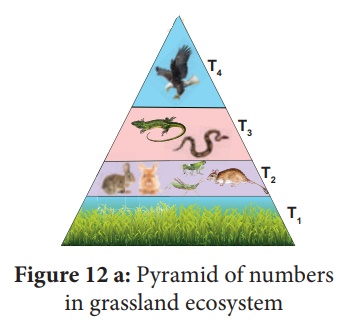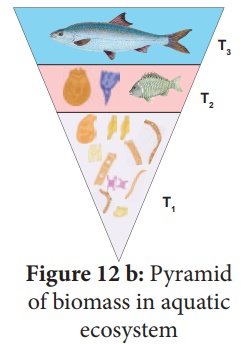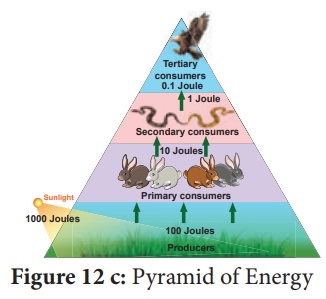Models / Photographs / Pictures | Botany Practicals - Types of ecological pyramid | 12th Botany : Practicals
Chapter: 12th Botany : Practicals
Types of ecological pyramid
Models / Photographs / Charts
Exercise : Types of ecological pyramid
Aim: To study and identify the different types of ecological pyramids
Principle: The relationship between different trophic levels in an ecosystem when shown diagrammatically appear as ŌĆśecological pyramidsŌĆÖ. In these ecological pyramids, the successive tiers represent successive trophic levels towards the apex. The base of the pyramid is of producers, the next one above it is of herbivores and the top tiers are of carnivores. The top most or apex represents the tertiary or top level consumers.
Requirements: Models / Photographs / Pictures of different types of ecological pyramid.
A. Pyramid of numbers
Diagnostic Features
┬Ę The number of organism that are present in successive trophic levels of an ecosystem is shown in the pyramid of numbers of a grassland ecosystem.
┬Ę There is a gradual decrease in the number of organisms in each trophic level from producers to primary consumers, then to secondary consumer, and finally to tertiary consumers.
┬Ę Therefore, pyramid of number in grassland ecosystem is always upright.
T1 - Producers | T2 - Herbivores | T3 - Secondary consumers | T4 - Tertiary consumers

B. Pyramid of biomass
Diagnostic Features
┬Ę Pyramid of biomass represents the total biomass or standing crop (dry weight) of organisms in each trophic level at a particular time.
┬Ę In aquatic ecosystem, the bottom of the pyramid is occupied by the producers, which comprises very small organisms (algae and phytoplanktons) possessing the least biomass and so the value gradually increases towards the tip of the pyramid.
┬Ę Therefore, here the pyramid of biomass is always inverted in shape.
T1 - Producers | T2 - Herbivores | T3 - Secondary consumers |

C. Pyramid of energy
Diagnostic Features
┬Ę Pyramid of energy represents the number of joules transferred from one trophic level to next.
┬Ę The bottom of the pyramid of energy is occupied by the producers. There is a gradual decrease in energy transfer at successive trophic levels from producers to the upper levels.
┬Ę Therefore pyramid of energy is always upright.

Related Topics